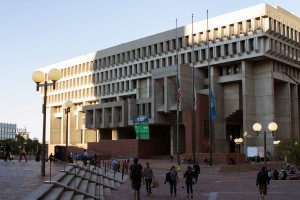
The U.S. Supreme Court dismissed the appeals of five states seeking same-sex marriage bans Monday, a move that has increased the number of states that allow same sex marriage to 30.
Indiana, Virginia, Wisconsin, Oklahoma and Utah have been added to the list of states that no longer has bans placed on same-sex marriage, according to a decision made after several states placed appeals on the ruling. Six more states could be impacted by this decision.
“Today’s decision by the Supreme Court is an enormous victory for equality in this nation…Massachusetts has shown that the institution of marriage is only strengthened when we embrace equality,” said Democratic gubernatorial candidate and Massachusetts Attorney Gen. Martha Coakley, in an emailed statement. “We will celebrate today’s victory, and tomorrow, we get right back to work in the fight to ensure equality for all.”
Across the 30 states, the same-sex marriages of residents will be recognized, and marriage equality is a freedom that Kara Coredini, executive director of MassEquality, said has often been salvaged in the past.
“Married couples are treated as unmarried in instances ranging from accidents, where they are prohibited from seeing or enforcing the wishes of a dying spouse, to the inability to seek the help of the courts to dissolve their relationship,” Coredini said in an email. “We have more work to do until the freedom to marry is fully available to every same-sex couple in every state across the nation.”
If the appeal were also to affect the six additional states as expected, 7 in 10 same-sex couples will be able to have their marriages legally recognized, Coredini said.
“The Supreme Court’s decision not to review the marriage equality cases leaves the decisions of the lower courts in effect. In total, families in 11 states will now enjoy the freedom to marry,” Coredini said. “Following the Supreme Court’s decision, and legal developments that immediately followed it, 35 states now have or will soon have the freedom to marry.”
Support for same-sex marriage has increased significantly over the past decade. Massachusetts became the first state to allow same-sex marriage in 2004, and now, about 60 percent of the U.S. population has the ability to engage in same-sex marriage, said Christopher Ott, spokesman for the American Civil Liberties Union of Massachusetts.
“The [significance of this decision] signals that the Justices are comfortable with lower court decisions in favor of marriage and helps pave the way for the freedom to marry nationwide,” Ott said in an email. “It is important for gay and lesbian couples and their families to be able to count on the protections of marriage no matter where in the country they travel or live.”
Brian Camenker, spokesman for MassResistance, the “pro-family action center for Massachusetts,” said he believes this Supreme Court tactic is an intrusion on states’ rights, and this is a misuse of the 14th Amendment.
“It’s a terrible, rotten, tactic that is not constitutional or legal but is something that they are certainly trying to do in order to compromise the rights of other states,” he said. “I would love to see it discussed [in the upcoming gubernatorial race], but it’s probably not something that one would expect would be taken up in the next few weeks of debates. It’s been going on for 10 years.”
Several Boston residents said they leaned toward more positive implications of the decision and praised the decision as a milestone for the LGBT community.
Zach Honey, 26, of Fenway, said the fact that progress is being made in more conservative states shows major progress.
“It’s kind of amazing,” he said. “Some of the states that this has opened up marriage equality for are very conservative.”
Katie Stocking, 27, of Allston, said she would be happy for same-sex couples if they were allowed to legally marry.
“I’m for gay marriage, and I think everyone should be able to have equal rights,” she said. “If you’re in love then why not have the same rights?”
Katie Martell, 27, of the North End, said she believes this decision is progress for the gay rights movement.
“This non-decision may look like a set back, but it’s actually progress allowing for continued momentum in the gay rights movement,” she said. “It’s a big deal.”






















































































































